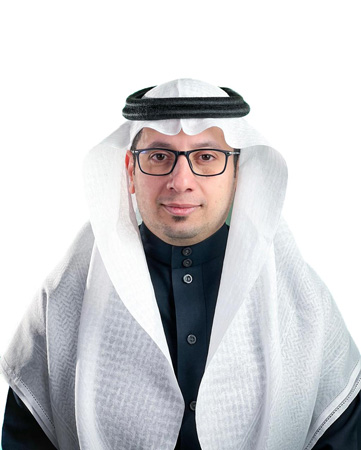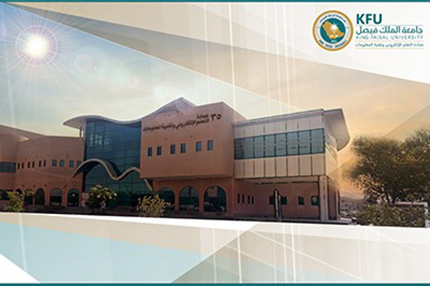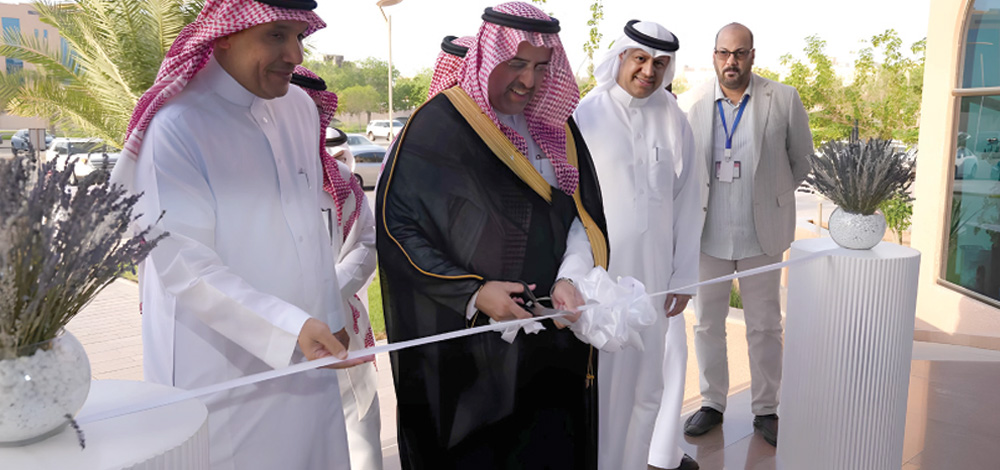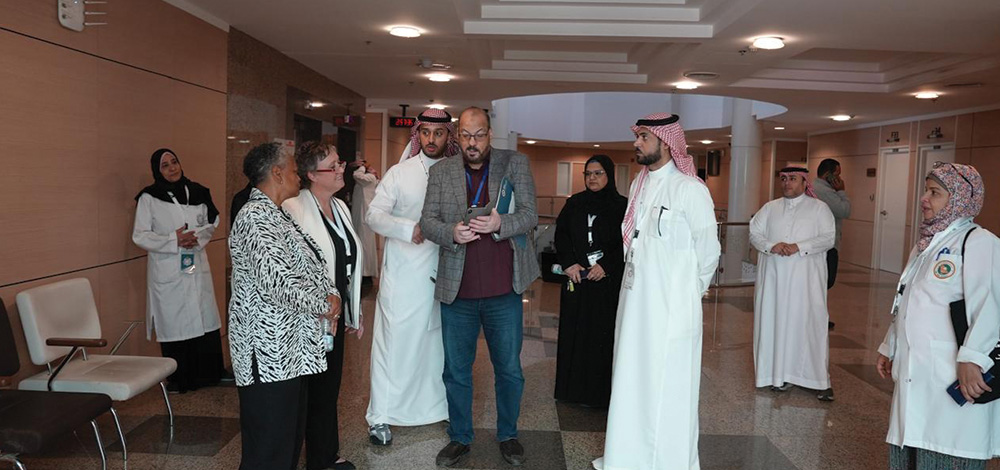In the Name of Allah, the Most Gracious, the Most Merciful
The Deanship of E-Learning and Information Technology (DELIT) at King Faisal University is committed to fostering innovation and excellence in teaching and learning. This is achieved by adopting the finest global standards and best practices in E-learning and continuing education. These efforts have led to the development of advanced academic programs that meet the needs of learners and have earned the Deanship prestigious awards both locally and internationally.
As part of the university’s digital transformation, the DELIT plays a pivotal role in managing the IT infrastructure, including the development of applications and digital services that support the university’s vision of leadership in digital education and training. These efforts have also enabled the university to represent the Kingdom of Saudi Arabia in international competitions and forums, further strengthening its role in advancing digital transformation across government institutions.
Recognizing the importance of system integration and enhancing the user experience, DELIT continuously develops digital solutions that ensure seamless access to information. This contributes to supporting decision-making based on the latest technological standards. In addition, DELIT strives to empower all university sectors to accelerate digital transformation, positively impacting academic, research, and administrative development, enhancing community partnerships, and achieving the university’s future aspirations.

To provide a comprehensive educational experience, DELIT is dedicated to producing high-quality learning content aligned with the university’s institutional identity, as well as the requirements of the National Center for E-Learning and the Ministry of Education. Additionally, DELIT works to develop E-learning and continuing education programs that keep pace with the labor market’s needs, leveraging the latest global technologies such as Artificial Intelligence (AI), Blockchain, Robotics, Augmented Reality (AR), Holography, and Metaverse applications.
We pray to Almighty Allah to grant us success in fulfilling the aspirations of our esteemed university and the vision of our wise leadership, as we work together to build a progressive and sustainable digital education future.
Dr. Ali Saeed Al-Zahrani
Dean of E-Learning and Information Technology
In the Name of Allah, the Most Gracious, the Most Merciful The Deanship of E-Learning and Information Technology (DELIT) at King Faisal University is committed to fostering innovation and excellence in teaching and learning. This is achieved by adopting the finest global standards and best practices in E-learning and continuing education. These efforts have led to the development of advanced academic programs that meet the needs of learners and have earned the Deanship prestigious awards both locally and internationally.

As part of the university’s digital transformation, the DELIT plays a pivotal role in managing the IT infrastructure, including the development of applications and digital services that support the university’s vision of leadership in digital education and training. These efforts have also enabled the university to represent the Kingdom of Saudi Arabia in international competitions and forums, further strengthening its role in advancing digital transformation across government institutions.
Recognizing the importance of system integration and enhancing the user experience, DELIT continuously develops digital solutions that ensure seamless access to information. This contributes to supporting decision-making based on the latest technological standards. In addition, DELIT strives to empower all university sectors to accelerate digital transformation, positively impacting academic, research, and administrative development, enhancing community partnerships, and achieving the university’s future aspirations.
To provide a comprehensive educational experience, DELIT is dedicated to producing high-quality learning content aligned with the university’s institutional identity, as well as the requirements of the National Center for E-Learning and the Ministry of Education. Additionally, DELIT works to develop E-learning and continuing education programs that keep pace with the labor market’s needs, leveraging the latest global technologies such as Artificial Intelligence (AI), Blockchain, Robotics, Augmented Reality (AR), Holography, and Metaverse applications.
We pray to Almighty Allah to grant us success in fulfilling the aspirations of our esteemed university and the vision of our wise leadership, as we work together to build a progressive and sustainable digital education future.
Dr. Ali Saeed Al-Zahrani
Dean of E-Learning and Information Technology
Driving regional leadership and achieving institutional excellence in innovative E-learning, cutting-edge information technology, and digital transformation.
Creating a unique competitive feature and distinctive E-learning and technology education at the university by establishing innovative and creative digital work models to deliver transformative E-learning and technology services. Thus, the deanship forges smart work environments and harnesses cutting-edge technologies to create E-learning and technology experiences for all university beneficiaries.

The Deanship of E-Learning and Distance Education offers a distinctive model for distance education characterized by inclusivity and high efficiency, in accordance with educational, technical, and institutional standards in the field of E-learning. The Deanship provides students with a range of academic activities and services, including admission and registration services, student affairs support, and services for monitoring students’ progress, evaluating performance, and providing data for decision-making, among others. All these services are delivered electronically through an integrated E-Systems that mirror the traditional educational framework of the university in all its activities and events.
Faculty members conduct lectures, meetings, and office hours using synchronous learning systems that provide direct interaction between students and their instructors. The course instructor records lectures and all associated activities electronically, schedules them, and classifies them into digital course materials linked to the e-learning management system. Then, students can access and attend these lectures at any time. Regarding course activities, faculty members provide assignments, discussion questions, and quizzes through the e-learning management system. Student performance monitoring systems generate reports on the quality of the educational process and student performance in various course activities. Furthermore, the faculty members can meet with their students directly via the internet to present the course content with audio and video, receive student questions, and conduct all traditional classroom interactions and activities electronically.
This university educational system grants students a Bachelor's degree in one of the available specializations upon completing graduation requirements (Distance Education). It utilizes modern technologies to address the challenges of the traditional distance education model by employing specialized global systems in E-learning and distance education, primarily relying on information and communication technology. Additionally, it incorporates interactive virtual learning systems that facilitate direct interaction between students and instructors, along with the necessary software for preparing and developing e-materials. Advanced systems are also used to record lectures and make them available to students, allowing for browsing and replaying via the internet at any time and from any location.
Blended Learning refers to the integration of communication technologies and information technology in delivering and supporting the educational process. It combines objectives, content, sources, learning activities, and information delivery methods through two approaches: face-to-face learning and distance education, according to a specific ratio determined by the academic department offering the programs based on curriculum requirements and learning outcomes. This approach enhances interaction and leverages the advantages offered by technology in the educational process. The Deanship of E-Learning and Information Technology presents an innovative model for delivering this type of E-learning that achieves learning outcomes and meets the market's human resource needs in line with modern developments and the requirements of the digital economy.
- Enhancing the efficiency and quality of educational and digital processes at the university in accordance with national and international standards, while increasing the level of trust in the university's graduates within the labor market
- Utilizing artificial intelligence and emerging technologies to develop academic, administrative, and digital learning processes in alignment with national and international digital standards and frameworks.
- Developing high-quality E-services accessible through multiple digital channels to enhance the experience and engagement of beneficiaries, and increase their satisfaction levels.
- Achieving excellence in E-learning and information technology at both national and global levels by obtaining accreditation certificates and actively participating in conferences and national and international competitions.
- Providing opportunities for university education to all members of the community by introducing programs delivered through e-learning modes and creating a modern learning environment that encourages students to innovate and excel in their skills.
- Developing and governing the institutional framework of the university while establishing new business models that support and accelerate digital transformation projects, in alignment with the programs and objectives of the Kingdom’s Vision 2030.
- Responsible citizenship.
- Integration based on multidisciplinarity.
- Innovation in originating, producing and applying knowledge.
- Respect for ideas, opinions, and diversity
- Justice that boosts transparency and belonging.
- Empowerment of expertise and capabilities.
- Department of E-Learning Programs
- Academic Affairs Unit
- Digital Content Design Unit
- Examinations Unit
- University Requirements Courses Unit
- Department of E-Learning Systems
- Department of E-Learning Operations and Maintenance
- E-Services Unit
- E-Training Unit
- Department of Networks and Systems
- Department of Software and Applications
- Department of Technical Equipment
- Department of Beneficiary Services and Relations
- Department of Technical Support and Assistance
- Information Security Unit
- Cloud Computing Unit
- Development and Total Quality Unit
- Digital Projects Management Office
- Digital Certification Issuance Office
- Digital Transformation and Institutional Structure Unit
- Artificial Intelligence and Emerging Technologies Unit










| Department | IP | |
|---|---|---|
| Networks and Systems | 8473 | DIT.NOSD@kfu.edu.sa |
| Software and Applications | 5584 | DIT.SAD@kfu.edu.sa |
| Beneficiary Services and Relations | 5211 | DIT.CSO@kfu.edu.sa |
| Technical Support and Assistance | 9888 | DIT.NOSD@kfu.edu.sa |
| Department | |
|---|---|
| Student Services | 0135895664 |
| Academic Affairs | 0135898363 |
| Financial Affairs | 0135898361 |
| University Requirements (Regular) | 0135898392 |







